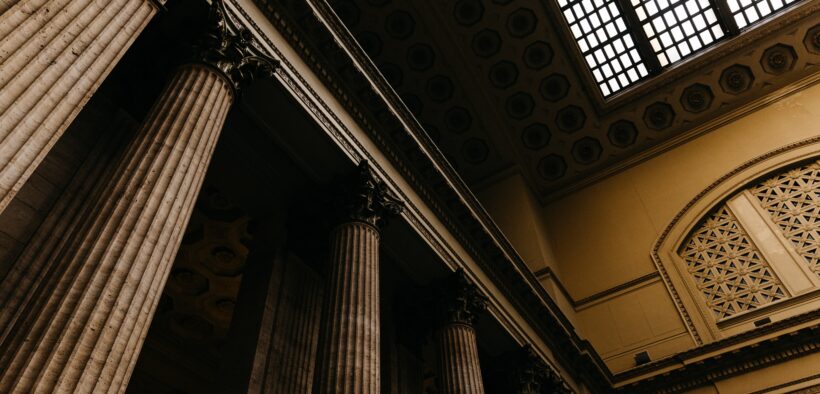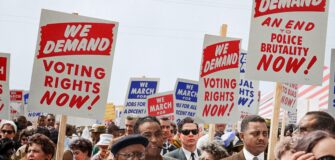The Ambiguous Legalities Underscoring the Mar-a-Lago Investigation
Share

Image Credits: @patrickian4 on Unsplash (Unsplash License)
It was August 8 when news broke detailing a nine hour FBI investigation of former President Donald Trump’s Mar-a-Lago estate, initiating a spiral of sly testimonies, arduous investigations, and forestalling utilization of the law. The official United States Court Search and Seizure Warrant revealed more than two dozen boxes of documents found in Trump’s storage room and office, eleven documents of which were marked as “classified.” In the dawn of the FBI’s initial public statements, publicization of the investigation was dominated by speculation surrounding the means by which the documents were seized: three federal statutes of The United States Code – 18 U.S.C. §§ 793, 2071, and 1519 – pertaining to gathering, transmitting, or using defense information; concealment, removal or mutilation generally; and destruction, alteration, or falsification of records in Federal investigations and bankruptcy, respectively. However, before discussing the subsequent dramatic unsealing of a redacted version of the official Mar-a-Lago affidavit, it is worth recounting the true origins of the FBI investigation in the wake of August 8, providing context for what sparked such widespread public speculation of denial and untruth.
The initial onset of investigation dates back to early February 2022, when, after returning fifteen boxes of documents to the national archives on January 18, as detailed by the affidavit, Trump’s lawyer Alex Cannon refused to notify the national archives and release a public statement stating that all documents had been returned. On February 9, National Archive officials asked the Department of Justice to investigate Trump’s handling of White House records as suspicion began to circulate hypothesizing the possibility that Trump had destroyed and misplaced documents at his Mar-a-Lago estate. The DOJ probe initially focused on culminating evidence that Trump violated the Presidential Records Act, which asserts that White House must preserve all historically relevant material and hand it over to the National Archives when the administration leaves office. Meanwhile, Trump offered an uncharacteristically restrained response, dodging any clear-cut statement addressing allegations of document destruction. However, this statement did little to halt further examination. Representative Carolyn B. Maloney, Chairwoman of the House Committee on Oversight and Reform, sent a letter to the National Archives requesting continued investigation regarding the content of the documents, cementing this discrepancy as a topic worthy of FBI involvement.
With the severity of the investigation surging, Trump hired lawyer Evan Corcoran, an acclaimed defendant of participants in the January 6th Capitol attack, to handle FBI inquiries. He proceeded to email the archives requesting for additional time to review the returned documents, threatening that if more time was not provided the letter served as “a protective assertion of executive privilege made by counsel for the former President.” In this case, “executive privilege” refers to Article II, Section 3 of the Constitution, as Corcoran invoked this safeguard with the intention of postponing future investigation — but retrospectively, this served merely as a stall tactic. On May 10, the National Archives issued a letter to Trump using the case of Nixon v. Administrator of General Services as grounds for ceasing allegiance to “executive privilege” and warning that additional FBI investigation would ensue.
The investigation kicked off with a grand jury subpoena seeking all “documents with classification markings” in Trump’s possession. Despite receiving an extension of the deadline to adhere to the subpoena, Corcoran sent a letter to Jay Bratt, chief of the Justice Department’s Counterintelligence and Export Control Section, stating that Trump had already returned documents in January in a “voluntary and open process,” and suggesting that Trump would not be criminally liable for any interactions with classified documents as that would “implicate grave constitutional separation of power issues.” On June 3, Bratt and three FBI agents met with Trump and Corcran in the Mar-a-Lago estate to relinquish the subpoenaed documents, uncovering 38 additional documents with classified markings, including 17 labeled “top secret.” Furthermore, according to the affidavit, Bratt emailed Corcoran just five days later requesting that any other documents remain in storage at Mar-a-Lago and not be disturbed, setting the stage for August 5. Magistrate Judge Bruce E. Reinhart approved the FBI’s request for a search warrant as Trump’s aforementioned violations of United States Code Section 18 ruled out any defense pertaining the Fourth Amendment’s protections of unreasonable search and seizure and instead invoked “probable cause.”
That brings us back to August 8, when, after tussling with contradictory claims from Trump and his defense for nearly eight months after the original set of documents were handed over, armed FBI agents abruptly swarmed Trump’s Mar-a-Lago estate. Initially, public information regarding the search was limited, and news sources characterized their analysis with conjecture and uncertainty surrounding the rationale and legality of the FBI’s sudden action. But on August 18, the rhetoric of reports shifted from speculation to anticipation — the DOJ would reportedly release an affidavit “only after redaction,” aiding with public delineation of the FBI’s actions. Just a week later, the redacted affidavit was released, sending news sources into a frenzy to report the twisted tale of testimony that caused the seemingly straightforward actions of Trump on January 18 to evolve into a national spectacle eight months later. The release of the affidavit also triggered two other key developments: Trump’s staunch denial of wrongdoing resulting in the combative initiation of Donald J. Trump vs. The United States of America and Trump’s defense team left reeling as the affidavit has undermined much of their credibility.
As for Trump’s ongoing court case, since the affidavit has been released, much of his aggressive locution has been aimed at the “unjust” nature of the August 8 raid, coupled with claims that he was cooperative amidst the entirety of interactions with the National Archives Committee. However, Donald J. Trump vs. The United States of America entertains an entirely different aspect of the legal proceedings altogether; Judge Aileen Cannon of The United States District Court of Southern Florida ruled that Trump’s classified documents should be reviewed solely by a Special Master (an external expert appointed by Cannon), a rarely used option that seeks to avoid any tampering of evidence. After the 11th Circuit of the US Court of Appeals confirmed they were in accordance with Cannon’s request, Trump’s legal team launched an emergency application to The Supreme Court surrounding how the documents will be reviewed, their specific gripe pertaining to scope of documents. In a new filing, Trump’s attorneys stated that “any limit on the comprehensive and transparent review of materials seized in the extraordinary raid of a President’s home erodes public confidence in our system of justice.” The initial application of Trump’s legal team covered an array of supposed discrepancies with Cannon’s proceedings, but the official case being reviewed by the 11th Circuit in tandem with the SCOTUS specifically addresses whether classified documents are being reviewed by the Special Master. Due to the narrow scope of litigation required for the case, a new order from the 11th Circuit, signed by Circuit Judge Adalberto Jordan, expedited the deadline of a final November 17, but the reviews of the 11th Circuit have yet to be paralleled with the SCOTUS. Thus, the case remains active as of November 23.
The August 26th affidavit has also caused collateral damage for Trump’s team of lawyers. Still licking their wounds after a carefully engineered battle to avoid further Mar-a-Lago investigation resulted in a contradictory affidavit and aggressive advancement of legal proceedings, the ethos of Trump’s legal team continues to be challenged. Furthermore, the loss in the face of The United States District Court of Southern Florida’s ruling, paired with the peculiar and unpromising nature of Donald J. Trump vs. The United States of America has not helped their tangible legal track record, either. Trump’s team has reportedly been subject to infighting, and even more concerning accusations have circulated regarding the verifiably untrue statements of Corcoran and legal partner Christina Bobb during the events leading up to August 6. To make matters even worse, Trump’s legal team is contending with a House Select Committee-issued subpoena relevant to January 6. To top this chaos off, the majority of Trump-backed candidates lost in the Midterm elections, an exclamation that could be the final blow in tarnishing the enduring nature of Trump’s devoted fanbase. Regardless of what the official investigation of Mar-a-Lago documents uncovers, the unfathomable rollout of events that cascaded following the affidavit, in tandem with its continual impact on American legal history, cements the revelations of August 8 as another integral component of Trump’s enigmatic legacy.


Want to get involved?
Connect with us! Connect with us!